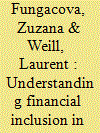| Srl | Item |
| 1 |
ID:
124551


|
|
|
|
|
| Publication |
2013.
|
| Summary/Abstract |
This paper addresses the relationship between bank competition and efficiency by computing Lerner indices and cost efficiency scores for a sample of Chinese banks over the period 2002-2011. Granger-causality tests are performed in a dynamic GMM panel estimator framework to evaluate the sign and direction of causality between them. We observe no increase in bank competition over the period, even as cost efficiency improves. In a departure from the empirical literature showing that competition negatively Granger-causes cost efficiency for Western banks, we find no significant relation between competition and efficiency. This suggests that measures to increase bank competition in the Chinese context are not detrimental to efficiency.
|
|
|
|
|
|
|
|
|
|
|
|
|
|
|
|
| 2 |
ID:
143419


|
|
|
|
|
| Summary/Abstract |
We use data from the World Bank Global Findex database for 2011 to analyze financial inclusion in China, including comparisons with the other BRICS countries. We find a high level of financial inclusion in China manifested by greater use of formal account and formal savings than in the other BRICS. Financial exclusion, i.e., not having a formal account, is mainly voluntary. The use of formal credit is however less frequent in China than in the other BRICS. Borrowing through family or friends is the most common way of obtaining credit in all the BRICS countries, but other channels for borrowing are not very commonly used by individuals in China. We find that higher income, better education, being a man, and being older are associated with greater use of formal accounts and formal credit in China. Income and education influence the use of alternative sources of borrowing. Overall financial inclusion does not constitute a major problem in China, but such limited use of formal credit can create a challenge for further economic development.
|
|
|
|
|
|
|
|
|
|
|
|
|
|
|
|